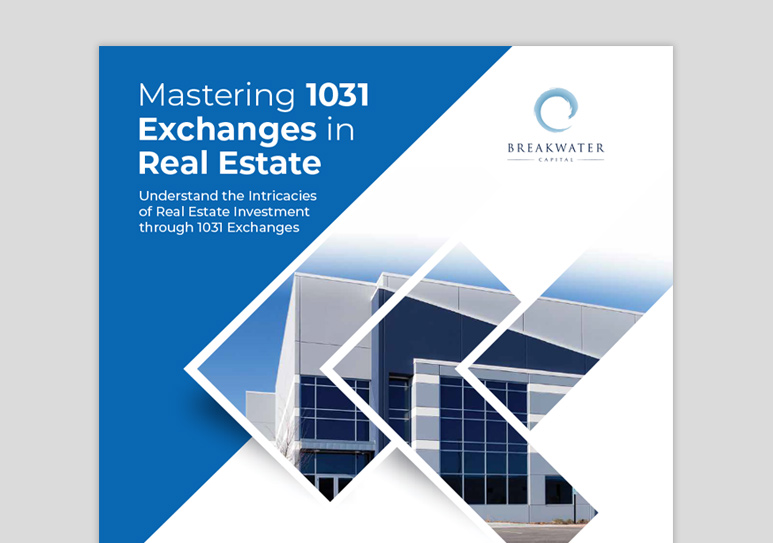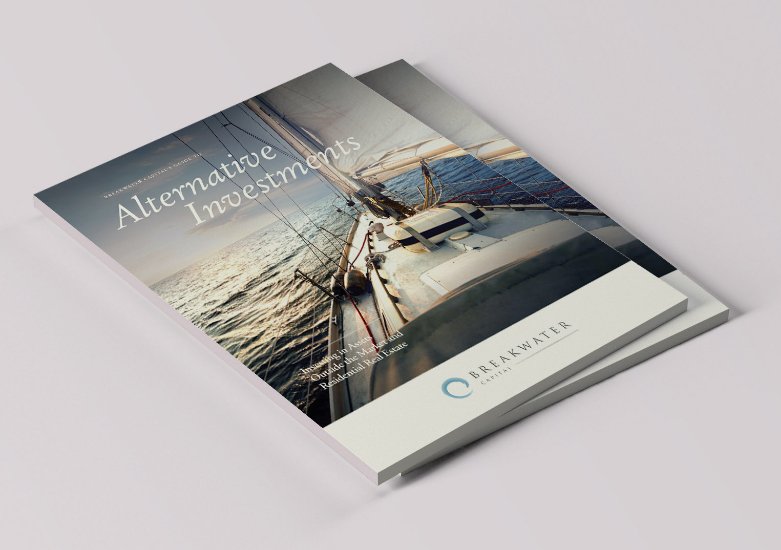
We work in a broker capacity and represent the various investment companies we choose to work with. We are not contractually obliged to work with any specific sponsor, the only reason we would recommend them to an investor is because we believe they are very good at what they do and have proven to us to be effective over the years working with them.
An investor will never have to deal with a bank at any point in time. The sponsor will structure the debt before a deal is available to investors and typically get much better rates than an individual investor due to the size of the offering. The debt to investors is defined as non-recourse, meaning that you are not personally responsible for the debt, the DST is. The investor assumes whatever debt the DST has already put in place. For example, if the DST has a 50% LTV and an investor allocates $100k, they will also receive another $100k in debt for an overall position of $200k.
A typical DST will structure the debt for 10 years with an initial 5-year interest only period, followed by another 5-year amortization period. The reasoning behind this is to attempt to maximize the cash flow and sell the property close to the 5-year mark.
A sponsor is the company that purchases the property, structures the debt, is responsible for management of every facet of the property from A to Z, then seeks to sell it within a certain period of time. Most will specialize within a given asset class (i.e. Multi-Family, Commercial, Industrial, etc.) and have similar offerings available on a regular basis.
While the trust owns the property, each investor is treated as a beneficial owner by the IRS. For instance, if a property is worth $100M (assuming no debt) and an investor allocates $1M, they would beneficially own 1% of the property. They are entitled to 1% of any income, appreciation and depreciation. It doesn’t matter whether they are the first or last investor, or the amount they invested, everyone is treated the same.
The sponsor is required to provide a tax statement to each investor every year. It will state how much income they received and how much depreciation they can use to offset said income. If an investor is working with a CPA, they can simply turn over this form to them.

The term 1031 Exchange is defined under section 1031 of the IRS Code. To put it simply, this strategy allows an investor to “defer” paying capital gains taxes on an investment property when it is sold, as long as another “like-kind property” is purchased with the profit gained by the sale of the first property
Affluent families have been using this tactic for generations as a means to avoid capital gains and minimize the tax impact of their real estate holdings to their heirs. Like our hypothetical outcome as expressed in the link below, we strive to help you take advantage of this rule, and provide turnkey 1031 exchange solutions that take away the complexity typically associated with this type of transaction.


For investors considering selling a real estate investment and deferring tax payments on their capital gains, a 1031 exchange could be an option for reinvestment. Understanding the complex guidelines for the 1031 exchange process can be challenging. However, with the right professional services, the process can be more convenient and accessible for any Accredited Investor.

Tax-deferred exchanging has been around a long while. In fact, in some form, it has been with us since the 1920s. However, the difficulty associated with completing an exchange from then up until the late seventies was directly related to those issues which arose around having to complete every transaction simultaneously.

Real estate owners are allowed a deduction called “depreciation” that reduces taxable income from the property. The depreciation deduction is intended to compensate property owners for wear, tear and obsolescence. The deduction increases the after-tax returns from real estate and is not Ravailable for financial assets, such as stocks and bonds

When dealing with the transfer of multiple properties and their associated transactional logistics, understanding the 1031 process and having access to a trusted exchanging expert represents the best strategy for a painless and successful exchange.


Industrial real estate supports trade, e-commerce, and supply chains globally and ensures the e cient movement of goods and materials across various markets. This category is one of the most versatile and specializes in providing properties for non-public commercial use.

Medical office space asset is an office building designated for medical purposes. A medical office building (MOB) can range from a small, 1,000-square-foot dental office to a modern hospital complex that spans millions of square footage.

If you’re interested in learning more about multifamily real estate investing for beginners, you must first understand what a multifamily investment is and what to know before buying a multifamily property. This guide to multifamily real estate investment can help potential investors as they consider this investment.

Self-storage, a booming asset class worth an estimated $48 billion and growing. In this article, we provide a primer on the self-storage industry and discuss some of the pros and cons for investors to consider when weighing a self-storage opportunity.

As the baby boomer generation transitions to senior living facilities, the demand for senior housing continues to increase. This expanding and under-served market has become a growing area for investment, attracting the attention of many investors.

NNN property is a property for which the lease agreement specifies that the tenant must pay all of the property’s expenses, including real estate taxes, insurance, and maintenance. The term “triple-net lease” comes from the fact that the lease on a NNN property requires the tenant to pay those three property expenses.

While many Exchangers are content to use their local real estate professional to find a property in their own area, others desire a more diversified selection of property types and geographic locations. Some also desire to transition from an active ownership and management role into a more passive one. If that is the case, Breakwater Capital can help you build a diversified portfolio of several different types of like-kind W investment properties


Commercial real estate, long considered an “alternative” asset class, has historically had significant barriers to entry. The cost, lack of widely-accessible property information, and risk associated with buying properties individually has meant that only the most well-off could enter the space. This includes institutional investors such as life insurance companies, endowments and pension funds as well as family offices and extremely high-net worth individuals.

How can risk be potentially reduced in real estate investments? It’s simple – by practicing diversification. Instead of investing in a single property with concentration risk, prudence dictates investing in a number of properties with different investment and risk parameters.

Breakwater Capital is an industry leader in offering replacement properties, typically through a Delaware Statutory Trust (DST), for Section 1031 exchange transactions, as well as quality, B multiple-owner real estate solutions

One of the single greatest advantages of utilizing DSTs in a 1031 exchange is the power to diversify your investment. In the example below, we took an investor exchanging their single-family rental into multiple DSTs

Investment Opportunities – Accredited real estate investors are in a unique position to diversify their investment strategy through private real estate funds. We offer a range of options to fit your circumstances, lifestyle needs, and financial objectives.


Alternative assets, once thought of as too risky for individual investors to pursue, are now becoming more mainstream. Investors looking to diversify their portfolios will certainly want to consider their options, including real estate. Investing with a real estate sponsor or fund that has a track record of performance is a way to seek to mitigate the risk otherwise associated with alternative investing.


Most of the action happens outside the stocks and bonds in your brokerage account. Public markets are just a small piece of the pie. Curious about the rest? We break down alternative investments with insights from the top professionals active in these private markets. Each episode dives into a new topic in the ever-changing world beyond the 80-20 portfolio. Explore new opportunities and build your book of alternative investments.
Start making more informed choices for your financial future with Breakwater Capital. Schedule a free in-person or virtual consultation so we can get to know each other. During our meeting we will discuss your finances at length to determine if Breakwater Capital is right for you.
Fill out a Contact Form to Request More Information or Schedule a Consultation

9940 Research Dr. Suite 200 Irvine, CA 92618
(310) 940-9430
Josh@Breakwater1031.com
Sign up to receive the latest1031 Exchange Deals and news from Breakwater Capital.
All investing involves risk of loss of some or all principal invested. Past performance is not indicative of future performance. There can be no guarantee that any investment or strategy will achieve its stated objectives. Speak to your tax and/or financial professional prior to investing. Securities and advisory services through Emerson Equity LLC, member FINRA and SIPC and a registered investment adviser. Emerson is not affiliated with any other entity identified herein.
There is no guarantee that any strategy will be successful or achieve investment objectives; Potential for property value loss – All real estate investments have the potential to lose value during the life of the investments; Change of tax status – The income stream and depreciation schedule for any investment property may affect the property owner’s income bracket and/or tax status. An unfavorable tax ruling may cancel deferral of capital gains and result in immediate tax liabilities; Potential for foreclosure – All fnanced real estate investments have potential for foreclosure; Illiquidity –These assets are commonly offered through private placement offerings and are illiquid securities. There is no secondary market for these investments;Reduction or Elimination of Monthly Cash Flow Distributions – Like any investment in real estate, if a property unexpectedly loses tenants or sustains substantial damage, there is potential for suspension of cash flow distributions; Impact of fees/expenses – Costs associated with the transaction may impact investors’ returns and may outweigh the tax benefts. Stated tax benefts – Any stated tax benefts are not guaranteed and are subject to changes in the tax code. Speak to your tax professional prior to investing.
Investing in opportunity zones is speculative. Opportunity zones are newly formed entities with no operating history. There is no assurance of investment return, property appreciation, or profits. The ability to resell the fund’s underlying investment properties or businesses is not guaranteed. Investing in opportunity zone funds may involve a higher level of risk than investing in other established real estate offerings. Long-term investment. Opportunity zone funds have illiquid underlying investments that may not be easy to sell and the return of capital and realization of gains, if any, from an investment will generally occur only upon the partial or complete disposition or refinancing of such investments. Limited secondary market for redemption. Although secondary markets may provide a liquidity option in limited circumstances, the amount you will receive typically is discounted to current valuations. Difficult valuation assessment. The portfolio holdings in opportunity zone funds may be difficult to value because financial markets or exchanges do not usually quote or trade the holdings. As such, market prices for most of a fund’s holdings will not be readily available. Capital call default consequences. Meeting capital calls to provide managers with the pledged capital is a contractual obligation of each investor. Failure to meet this requirement in a timely manner could elicit significant adverse consequences, including, without limitation, the forfeiture of your interest in the fund. Leverage. Opportunity zone funds may use leverage in connection with certain investments or participate in investments with highly leveraged capital structures. Leverage involves a high degree of financial risk and may increase the exposure of such investments to factors such as rising interest rates, downturns in the economy or deterioration in the condition of the assets underlying such investments. Unregistered investment. As with other unregistered investments, the regulatory protections of the Investment Company Act of 1940 are not available with unregistered securities. Regulation. It is possible, due to tax, regulatory, or investment decisions, that a fund, or its investors, are unable realize any tax benefits. You should evaluate the merits of the underlying investment and not solely invest in an opportunity zone fund for any potential tax advantage.